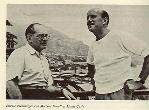| SOUNDTRACK SCREENPLAY DOWNLOADS SCREENINGS DVD |  |
|
|
 |
 |
 |
 |
 |
 |
|
||||||
|
Mexico The Critic The Rivera Murals The Casa Azul Jet-lag Festival Screening The Trotsky Museum Exile Profound Mexico Hope Rain on canvas The Jury The Anthropological Museum Time Political Correctness Two Houses False Virtue Life is a miracle Weird Roots The Meeting Turtles Can Fly The Oscars Luis Barragans house Back to Diary Index |
Hope At the screening of YES that night there is a very long question and answer session. Virtually no-one leaves the cinema after the film. A tall, thin man standing broodily at the back of the auditorium asks, eventually, “But why the Hollywood ending?”. “Do you mean happy?” I ask, and then go on to speak of hope. The ending, it seems to me, is not so much happy as hopeful. It seems these two characters can meet, can talk, and even more important, can listen to each other. I speak of hope as a choice of point of view that energizes, where despair drags us down. But I also discuss how difficult endings are, for they seem, narratively, to be a summation of the meaning of a film, where often in fact the ending is not a closure, but the beginning of an unstated continuation. After the Q&A, when I am surrounded by eager faces in the aisles of the cinema, I am struck by the passion not just of the young of both sexes, but also evidenced in the faces and words of the middle-aged. I once heard someone speak of the ‘hidden army’ of middle-aged women; If someone knew how to tap into that great force, so underestimated, so often silenced and unseen, it would be unconquerable. I think of the mothers of the disappeared, bravely protesting in Argentina , but also the quieter armies of anonymous women world-wide whose skills and strengths are so often ignored. “Tell me your secret’, one of them urges, “I know you have a secret”. A teenage girl hovers nearby, trembling slightly. “Why do you make films?” she asks, eventually. I try to think of something to say, but then realize from her expression of longing that I need to ask her, in response, if she wants to make films herself. The answer, of course, is yes. I hug her and wish her luck, telling her she can do it if she really wants to. In these momentary encounters I always hold in the back of my mind a similar meeting I once had on a staircase in a cinema in London with Michael Powell and Emeric Pressburger after a screening of ‘Gone to Earth’. They had done a Q&A after the film, Michael Powell standing erect in a green lovat suit, with a red tie, and apple-red cheeks; and Emeric Pressburger, small and bent beside him, in a shabby-looking black suit, with a shock of white hair, and sporting a black eye because he had fallen the previous day, at a railway station. He was a study in black and white next to Michael Powell’s Technicolor appearance. They emanated love and respect for each other, expressed with tender irony. Afterwards I hovered amongst the crowds, probably trembling myself, with admiration and longing. Michael Powell caught my gaze and returned it. In a brief exchange he gave me some golden words of encouragement, and then so did Emeric: “cinema is like an arrow”. I never forgot their generosity, their intuitive sense of the significance of the encounter to an anonymous fan. So now I try to do the same; shut out the world for a few seconds or minutes and concentrate exclusively on the person in front of me to see if I can be of help for those brief moments; offer a word of encouragement, or simply receive the longing. Each person feels they know me, having watched the film and heard me talk, and I must try and return the compliment. back next |
 Emeric Pressburger and Michael Powell |
||||
Text © Sally Potter. All pictures © Adventure Pictures unless otherwise indicated |